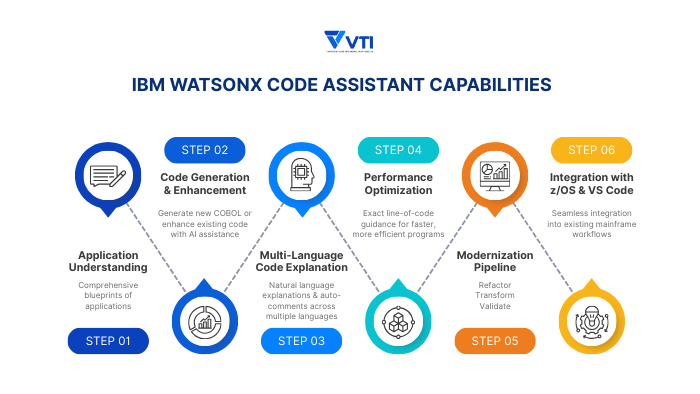Mainframe systems power 68% of the world’s business-critical transactions, government services throughout Asia, and insurance platforms globally. However, skilled mainframe developers are retiring faster than new ones can be trained. Thus, finding a developer who can read and write such programming languages (i.e. COBOL) is harder each year, which is “itching” banks, government agencies, and insurance companies worldwide. In such a context, IBM Watsonx Code Assistant for Z offers a breakthrough solution to this growing crisis by bringing AI directly to mainframe development.
So, what is it? Why is it standing out among a wide range of AI Copilots out there? With this guide, you will grab a quick view of how this specialized tool transforms legacy code maintenance, accelerates modernization efforts, and bridges the dangerous skills gap threatening mission-critical systems across industries.
What is IBM Watsonx Code Assistant for Z?
IBM Watsonx Code Assistant for Z is an AI-powered platform produced by IBM, designed specifically for Z, the enterprise’s current generation of mainframe computer systems. This AI-powered tool helps developers understand, create, and improve mainframe code written in languages like COBOL, PL/I, and assembler.
According to IBM’s official documentation, the platform excels particularly in bridging the knowledge gap left by retiring developers and poorly documented legacy systems. This solution addresses the growing challenge of maintaining critical business applications when fewer people understand the underlying programming languages. By bringing AI directly to mainframe development, it assists developers, both experienced and newcomers, in working with legacy applications while accelerating modernization efforts.
6 Key Capabilities and Features

The IBM Watsonx Code Assistant for Z delivers comprehensive support through seven distinct capabilities that span the entire mainframe development lifecycle. From initial application discovery and code explanation to complete modernization and validation, these integrated tools work together to accelerate every phase of mainframe development while ensuring quality and reliability at each step.
Application Understanding
The platform conducts deep program analysis to map your entire application landscape, documenting relationships and dependencies to create comprehensive application blueprints. This foundational understanding enables informed decision-making across all subsequent development activities.
Code Generation and Enhancement
Developers can generate new COBOL programs from simple business requirement descriptions, while the AI assistant helps update and enhance existing code with improved efficiency and quality standards.
Multi-Language Code Explanation
Beyond COBOL, the platform provides natural language explanations for PL/I, REXX, Assembler, and JCL code. These explanations can be automatically inserted as comments or exported for documentation purposes.
Performance Optimization
In-depth code analysis identifies inefficiencies and delivers targeted recommendations with exact line-of-code guidance through the VS Code interface. This ensures performance improvements without compromising the rock-solid reliability that mainframe environments demand.
Modernization Pipeline
The platform supports complete application modernization through a structured approach, with the following 3 final capabilities:
- Refactoring: Transform monolithic COBOL and PL/I applications into modular business services
- Transformation: Convert refactored COBOL code into modern object-oriented Java applications
- Validation: Automated test generation features ensure semantic equivalence between original COBOL and transformed Java code
This end-to-end modernization capability enables organizations to preserve business logic investments while gaining the flexibility and maintainability of contemporary development platforms.
Integration with z/OS Environments and Visual Studio Code Extensions
The system integrates directly with the development tools that mainframe programmers use every day. The primary interface works through Visual Studio Code extensions, giving developers a modern editing experience while maintaining full compatibility with z/OS systems. This integration means developers can access AI help without changing their established workflows.
Furthermore, the tight integration ensures the AI understands not just individual programs but how they fit into larger mainframe environments. The tool knows about dataset structures, batch job dependencies, and system constraints that affect program design. This comprehensive understanding helps generate suggestions that work reliably in real mainframe operations worldwide, whether supporting financial networks in North America or government systems across Asia.
Benefits for Mainframe Modernization with Watsonx Code Assistant
Accelerated Development and Enhanced Productivity
IBM Watsonx Code Assistant for Z automates time-consuming programming tasks by generating complete COBOL programs from plain language business requirements. Developers receive code with built-in error handling, validation, and optimization – especially valuable for regulatory changes and new feature rollouts.
The platform accelerates experienced developers through intelligent suggestions and pattern completion. When building customer processing routines, it automatically recommends standard file handling, logging, and backup procedures, reducing errors while ensuring consistency.
Debug cycles speed up dramatically as the AI explains complex program logic in simple terms, turning hours of code tracing into minutes of clear explanations.
Legacy Application Intelligence
Understanding decades-old mainframe applications with minimal documentation poses a persistent industry challenge. Watsonx Code Assistant analyzes thousands of lines of legacy code to generate comprehensive explanations of business logic, data dependencies, and program relationships.
For example, a 1980s billing system with undocumented rate calculations can be reverse-engineered to reveal complex algorithms, data sources, and underlying business rules. This capability preserves institutional knowledge as experienced developers retire.
Not less important, by preserving institutional knowledge in documented formats, the platform delivers strategic value, particularly crucial for organizations whose operations depend on decades of accumulated business rules and compliance logic that would be expensive to recreate.
Bridging the Critical Skills Gap
With mainframes processing $30 trillion in daily global transactions, yet 70% of organizations struggling to find qualified COBOL developers, the talent shortage threatens business continuity across financial, government, and insurance sectors.
Watsonx Code Assistant helps Java, Python, and other modern language developers transition to mainframe environments by translating traditional concepts into familiar programming paradigms. This can reduce typical 18-month COBOL onboarding periods to just a few months, expanding the available talent pool.
Strategic Modernization and Risk Mitigation
Rather than risky “big bang” approaches, the platform supports incremental modernization by identifying natural boundaries in monolithic applications and recommending modularization strategies that preserve business continuity.
When ready for platform migration, the AI transforms optimized COBOL code into object-oriented Java while maintaining semantic equivalence. Automated validation ensures converted applications produce identical results, dramatically reducing modernization risks.
Should your company use IBM Watsonx Code Assistant for Z? A Comparison with Other AI Copilots
The AI coding assistant market exploded in 2023, with over 81% of developers now using some form of AI help in their daily work. However, not all AI copilots are built the same way or solve the same problems. While most popular tools focus on modern web and cloud development, the IBM Watsonx Code Assistant for Z takes a completely different approach by targeting one of the most challenging areas in enterprise computing: mainframe development.
GitHub Copilot: Web Development Focus vs Mainframe Specialization
GitHub Copilot revolutionized coding by helping millions of developers write JavaScript, Python, and other modern languages faster. It excels at creating web applications, API endpoints, and cloud services that drive today’s digital economy. The tool understands popular frameworks like React, Django, and Node.js because these technologies are well-represented in its training data.
However, GitHub Copilot struggles with mainframe languages like COBOL, PL/I, and JCL because these weren’t common in open-source repositories used for training. The Watson code assistant solves this gap by using AI models trained specifically on mainframe code patterns and business logic. According to TechChannel, this focused training enables understanding of mainframe programming practices that general-purpose tools simply cannot match.
Amazon CodeWhisperer: Cloud-Native vs Enterprise Legacy Systems
Amazon CodeWhisperer targets modern cloud development with strong support for AWS services, containerized applications, and serverless computing. It helps developers build scalable applications that can handle millions of users across global cloud infrastructure, making it perfect for startups and cloud-first companies.
Yet CodeWhisperer’s cloud-native approach doesn’t translate to mainframe environments. Mainframes operate with unique concepts like batch processing, VSAM file systems, and CICS transaction processing that require specialized knowledge. IBM’s Code Assistant is better at understanding these mainframe-specific technologies and can generate JCL scripts, explain DB2 database operations, and optimize for the performance characteristics that matter in enterprise systems running everything from payroll processing to inventory management.
Microsoft Copilot: General Office Integration vs Specialized z/OS Development
Microsoft has integrated AI help across its development tools and Office suite, making it useful for everyday business tasks and general programming work. Visual Studio Code’s AI features work well for .NET development, web applications, and integration with Microsoft’s cloud services, appealing to organizations already invested in the Microsoft ecosystem.
However, Microsoft’s tools focus primarily on Windows and Azure environments. The IBM Watson Code Assistant specifically targets z/OS development, understanding the unique requirements of mainframe programming environments. It handles mainframe data sets, EBCDIC character encoding, and performance optimization patterns that are essential for systems processing trillions of dollars in transactions daily.
Unique Advantages of IBM Watsonx AI for Mainframe Environments
The IBM WatsonX AI platform offers capabilities that general-purpose AI tools cannot replicate. It provides end-to-end modernization support, from analyzing decades-old applications to transforming COBOL business logic into maintainable Java code while preserving semantic equivalence. This comprehensive approach addresses the urgent need to modernize aging systems without the risk and cost of complete replacement.
Moreover, the tool addresses the critical mainframe talent shortage in ways other AI copilots cannot. While GitHub Copilot helps experienced developers work faster, it doesn’t help newcomers understand mainframe concepts or preserve institutional knowledge that’s accumulated over decades of enterprise system development. The specialized focus on mainframe environments makes it an essential tool for organizations maintaining critical business systems worldwide.
Comparison Table
| Primary Focus | Key Strengths | Best For | |
| GitHub Copilot | Modern web and cloud development | – JavaScript, Python, modern languages – Popular frameworks (React, Django, Node.js) – Large open-source training data | – Startups and modern web development – Building APIs and cloud services – Teams using popular programming languages |
| Amazon CodeWhisperer | Cloud-native development | – AWS services integration – Containerized applications – Serverless computing – Scalable cloud infrastructure | – Cloud-first companies – AWS-centric development – Building globally scalable applications – Modern microservices architecture |
| Microsoft Copilot | General office and .NET development | – Visual Studio Code integration – .NET development support – Office suite integration – Microsoft ecosystem alignment | – Organizations using the Microsoft stack – Windows and Azure environments – General business programming tasks – Teams invested in Microsoft tools |
| IBM Watsonx Code Assistant for Z | Mainframe and legacy system modernization | – COBOL, PL/I, JCL expertise – z/OS development specialization – End-to-end modernization pipeline – Legacy code understanding and transformation | – Enterprise mainframe environments – Organizations with critical legacy systems – Teams facing mainframe talent shortages – Modernizing decades-old business applications |
Summary
The mainframe modernization challenge isn’t going away – it’s getting more urgent every day as experienced developers retire and business-critical systems age. IBM Watsonx Code Assistant for Z represents more than just another AI coding tool; it’s a strategic solution designed specifically for the unique demands of enterprise mainframe environments. Unlike general-purpose AI assistants that focus on modern web development, this specialized platform understands COBOL, handles z/OS complexities, and preserves decades of institutional knowledge that would otherwise be lost. For technology leaders managing mainframe systems, the question isn’t whether AI will transform how you maintain and modernize these critical applications – it’s whether you’ll adopt the right AI tools before the skills gap becomes insurmountable. Consider evaluating how IBM WatsonX Code Assistant for Z could protect your organization’s mainframe investments while preparing your development teams for the future.
VTI’s VCopilot
VCopilot is an intelligent coding assistant developed by VTI, one of Vietnam’s top 10 ICT companies. This AI-powered tool enhances developer productivity by intelligently indexing entire codebases and providing contextually relevant code suggestions through advanced embeddings-based retrieval and keyword search, with local processing for enhanced security and privacy.
![[FREE EBOOK] Strategic Vietnam IT Outsourcing: Optimizing Cost and Workforce Efficiency](https://vti.com.vn/wp-content/uploads/2023/08/cover-mockup_ebook-it-outsourcing-20230331111004-ynxdn-1.png)




